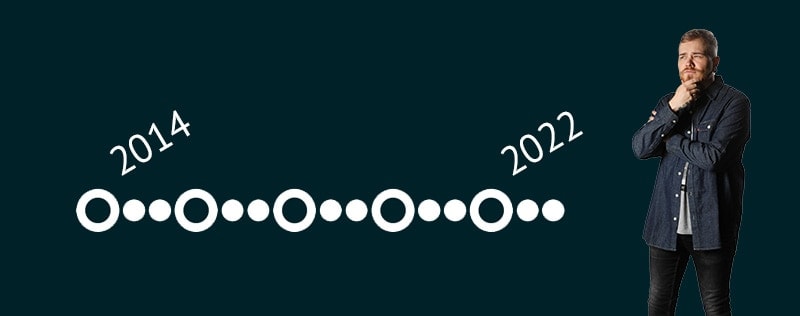Development, work community, and free time. These are things Markus Sukoinen, 29, from Turku, has learnt to value.
Markus works at ATR Soft as a full-stack engineer and is currently thinking about which specialisation path to choose. He is interested in cybersecurity because it would, in a way, allow him to be on the side of the good guys.
“My partner is a nurse. I would also like my own job to be the kind of job where I could help people.”
In 2019, Markus was working long hours at a game company. He had ended up as one of the company’s founders thanks to his passion for music.
“Of the people who started studying Information Technology at the Turku University of Applied Sciences at the same time as me, only two had a music hobby they were serious about. Projects were always missing the sound person.”
In 2016, when Markus was doing an internship in Japan for his Information Technology degree, he got a phone call. A group of students needed someone in their team to do the sounds for their games.
Once he returned home, Markus became very involved in the game industry. He spent most of his time creating games while his studies took second place. Next year, the game company Plush Pop Soft was founded.
The company mainly made mobile games, which were published by an external party. Markus took care of the games’ sound production and design.
“It was a pretty tough experience. We weren’t making that much money, and once the game was on the market, it didn’t even have our names on it.”
After a couple of years, Markus decided that he was done with making games, and it was time to graduate. He did his final project on implementing sounds in games and left the game industry after that.
“I tried to turn two beloved hobbies into a job and realised that it left me with no hobbies. I decided to do something else.”
The brand new engineering degree made the decision easier.
As programming skills had not been a big part of his studies, Markus decided to take advantage of the Code Bootcamp, which is supported by TE Services.
“I took part in the bootcamp in order to quickly get my programming skills to a level that would be more attractive to prospective employers.”
The bootcamp participants’ goal was to find a partner company that would take on a trainee and pay for the training.
“I was contacted by ATR. The brand new engineering degree must have been a big plus.”
Markus attended an interview and was given the green light. Around that time, the COVID-19 pandemic hit, and everyone switched to remote work.
“At first, I felt like I had no opportunities to get to know the people in my work community.”
The Code Academy involved one month of study and five months of working on a project. After completing these, Markus got a permanent position at ATR as a Software Engineer Trainee.
In three years, he has grown a lot as a software engineer. He is proud of the fact that he is now competent enough to be added to any project.
“I have focused on catching up with the people who have been writing code for longer than I have. Even though I have an engineering degree, I did take a pretty big change in direction.”
During his time at ATR, Markus has mostly worked with a single customer. He has, for example, developed a piece of software for creating data for testing batch services. In addition, he has acted as the software engineer for the maintenance and further development of multiple solutions. The technologies he has become familiar with include .NET, C#, JavaScript, Python & SQL.
However, he is now ready to open a new tab.
“The tasks I worked on made me a real software engineer. But they had become routine. And when you are no longer learning, I feel like it’s time for a change.”
Markus reached out to his foreperson, Ville, to agree on a time window within which his work would be reorganised. They found a new role for Markus in a project for another customer.
“I wanted to work on projects to see projects taken from start to finish using various technologies.”
Markus was also interested in the team around the other customer relationship, where he believes he will have the chance to grow as a software engineer.
He has prepared for the new project by, for example, using the monthly learning day to learn more about the JHipster platform. By working with a new customer, Markus will also have the chance to use the Java and JavaScript front-end technologies.
Markus appreciates ATR’s flexibility. The company allows its employees to work part-time while studying, and everyone can hold on to their boundaries.
“At some point, I was talking about switching to a four-day week, and this would have been possible. These kinds of things are painless at ATR.”
Nowadays, Markus knows how to appreciate having free time. He works to make life outside of work possible.
About half of his working hours are spent at the office. He usually works remotely every other week. For Markus, this kind of hybrid work feels like a good fit right now.
“I like to see my co-workers face-to-face and be part of the work community. The atmosphere and co-workers are extremely important to me.”
Before switching to new tasks, Markus spent a month helping a colleague take over his previous tasks, and he has also given his colleague tips on how to proceed later on.
“Helping others gives me a good feeling. Those moments are some of the highlights of my day.”
Career path

2013
- Starts studying Mechanical Engineering at the Turku University of Applied Sciences. The field does not feel like his thing.
- While attending a book fair, comes across the Turku University of Applied Sciences’ stand advertising the Information Technology degree programme and the game technology specialisation.
- Sits the entrance exams in the summer and starts the Information Technology degree programme in the autumn.
2015
- Is not accepted for the popular game technology specialisation on his first try.
- Starts work at theFIRMA, which is the university’s work environment that operates like a real company.
2016
- Embarks on a three-month internship in Japan. Works on a gamification project, where a traditional poetry book (The Pillow Book) is turned into an experience that is interesting to young people.
- Is asked to join a group of students that makes games.
- Is accepted for the game technology specialisation.
2017
- Together with the group of students, co-founds a mobile game company called Plush Pop Soft.
2019
- Graduates as an Information Technology engineer with a final project on implementing sounds in games.
- Stops working on games and takes advantage of the Code Bootcamp programme to improve his programming skills.
- Starts work at ATR as a Software Engineering trainee through the Code Academy programme and gets a permanent position.
2020
- Is promoted to Junior Software Engineer.
- Develops software, including one that the customer can use to create the necessary test data for batch jobs.
2021
- Works on the maintenance and further development of multiple solutions and settles into his role as Software Engineer.
2022
- Switches over to projects.
- At the same time, starts working with a new customer and industry.

